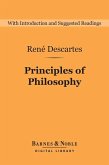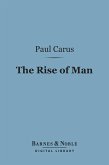This edition includes a modern introduction and a list of suggested further reading.
One of the most interesting features of A Treatise Concerning the Principles of Human Knowledge is the symbiosis between a radical empiricism and a bold and uncompromising idealism. An artful combination of analytical rigor and unfettered speculation, of crystal-like precision of language and winged metaphors or sparkling images, George Berkeley's work is essentially a God-centered philosophy that argues that something exists only insofar as it is perceived by the mind.
Dieser Download kann aus rechtlichen Gründen nur mit Rechnungsadresse in A, D ausgeliefert werden.
Es gelten unsere Allgemeinen Geschäftsbedingungen: www.buecher.de/agb
Impressum
www.buecher.de ist ein Internetauftritt der buecher.de internetstores GmbH
Geschäftsführung: Monica Sawhney | Roland Kölbl | Günter Hilger
Sitz der Gesellschaft: Batheyer Straße 115 - 117, 58099 Hagen
Postanschrift: Bürgermeister-Wegele-Str. 12, 86167 Augsburg
Amtsgericht Hagen HRB 13257
Steuernummer: 321/5800/1497
USt-IdNr: DE450055826
Bitte wählen Sie Ihr Anliegen aus.
Rechnungen
Retourenschein anfordern
Bestellstatus
Storno









